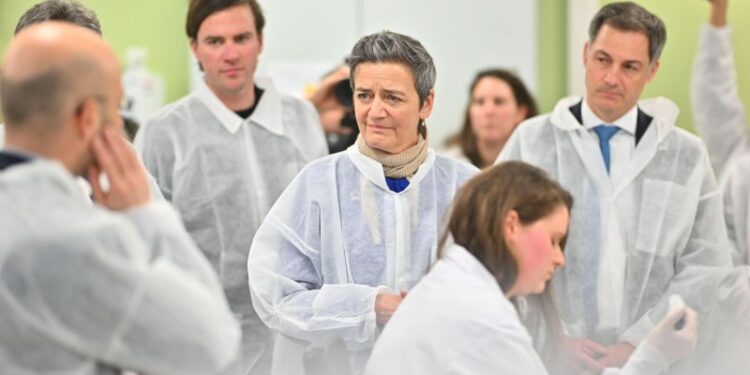Despite Belgium’s prominent position as Europe’s second-largest biotech industry and its significant achievements in medical innovation, the pursuit of fast and sustainable access to life-saving therapies remains problematic, for Belgium and Europe.
In 2021, the Belgian government, academia, and the biopharmaceutical sector united to sign a long-term charter and strategy to bolster the sector. A mid-term evaluation last October revealed progress, yet significant challenges persist, notably concerning access to innovative medicines.
“We need to work on this,” stressed Prime Minister Alexander De Croo during a visit to rare disease biotech pioneer Argenx. De Croo was visiting Argenx with European Commission Executive-President, Margrethe Vestager, showcasing Belgium’s biotech excellence but also acknowledging the imperative for collective action to address access challenges for biotech innovation.
“What’s crucial is ensuring patients have access to the innovative work taking place here,” said De Croo. “And there we have a way to go; we need to get better at this by working together in Europe.”
Invented in Europe does not guarantee early access
Innovation born in Europe does not automatically translate into early access, as shown in the case of Argenx’s flagship rare disease drug. Despite its origins within the EU, Europe trails behind the United States by over six months in bringing the medication to patients.
Within Europe, Belgium witnessed a significant delay, with the treatment becoming available and reimbursed on February 1, 2024, over 15 months later than in the fastest EU member state, Germany.
The Belgian situation
A Rare Disease Memorandum launched on February 14 by the Belgian National Alliance, RaDiOrg, brings attention to Belgium’s access landscape. According to the memorandum, as of October 1, 2022, Belgian patients had access to only 58% of medicines registered by the European Medicines Agency (EMA) for rare diseases.
The average reimbursement time after EMA market authorisation was 638 days for orphan drugs approved between 2018-2021. This places Belgium in the middle among West European countries—a decline compared to previous years.
Representing RaDiOrg, Eva Schoeters emphasised to Euractiv the urgency of enhanced access to promising therapies for rare diseases, remarking to Euractiv: “Most rare diseases are severe conditions with high mortality and/or morbidity rates, often presenting limited therapeutic options. Access to promising new therapies is imperative. Procedures for early access to such medications and reimbursements must be tailored to address these unique needs.”
Additionally, Schoeters urged for harmonisation across all European countries in terms of access, she said: “ […] we rely on Belgium to contribute to the implementation of such a European collaboration. For rare diseases, international collaboration is key.”
Towards enhanced collaboration and access
Collaboration emerges as a beacon of hope amidst these challenges, as demonstrated by the successful conclusion of negotiations for a rare disease gene therapy under the BeNeLuxA Initiative.
This cross-border partnership, involving Belgium, the Netherlands, Luxembourg, Austria and Ireland, illustrates the power of unified action in ensuring equitable access to innovative treatments. “By working together across national borders, we can make vital medicines available to patients,” stated Health Minister Vandenbroucke.
The latest agreement for the rare disease therapy was reached between the manufacturer and three members of the initiative: Ireland, Belgium and the Netherlands.
Paving the way forward
We spoke to Boston Consulting Group (BCG), who worked on the evaluation of the Belgian long-term strategy with representatives of the Cabinet of the Prime Minister, the HST Group (UCB, Johnson & Johnson, GSK, and Pfizer), and innovative biopharma and biotech industry associations pharma.be and bio.be/essenscia.
“To regain its status as an early-stage launch country, we identified several actions in our research that could be taken, such as refining and putting into practice relevant policies to ensure swift and sustainable market access, improving the separation of assessment and appraisal phase in the reimbursement process, and considering early access programs for patients,” commented Jonas Geerinck of BCG.
Belgium is now taking proactive steps towards modernising reimbursement procedures. “The draft laws necessary for the implementation of the various reforms outlined in the Roadmap Market Access have been prepared. These draft laws are currently the subject of political discussions within the government,” confirmed The National Institute for Health and Disability Insurance (INAMI-RIZIV). No update is available about the progress of the discussions or the timing.
Collaboration at EU level
De Croo believes that crucial levers for a future-proof pharmaceutical policy lie at the EU level and in collaboration among member states.
Commissioner Vestager’s announcement of the EU Biotech and Biomanufacturing Initiative’s release on March 20 signals a broader effort to revitalise regulatory frameworks and stimulate the biotech sector.
Speaking at Argenx, Vestager said: “We are determined to maximise the potential of Europe’s stronghold in biotech. Since biotech is a relative newcomer, they got caught by old-school regulatory processes, which make them longer than they actually have to be. We want to renew our view of this to boost the sector.”
Anant Murthy, General Manager EMEA at Argenx, emphasised the importance of European authorities recognising and encouraging innovation, particularly through accelerated market access pathways and innovative access arrangements.
Together, these efforts pave the way for Belgium and Europe to overcome access challenges and unlock the full potential of biotech innovation for the benefit of patients and society as a whole.
[By Nicole Verbeeck, Edited by Vasiliki Angouridi, Brian Maguire | Euractiv’s Advocacy Lab]
Read more with Euractiv
Source link : https://www.euractiv.com/section/health-consumers/news/belgiums-biotech-ambition-confronts-access-challenges-beyond-rare-diseases/
Author :
Publish date : 2024-02-26 08:00:00
Copyright for syndicated content belongs to the linked Source.


